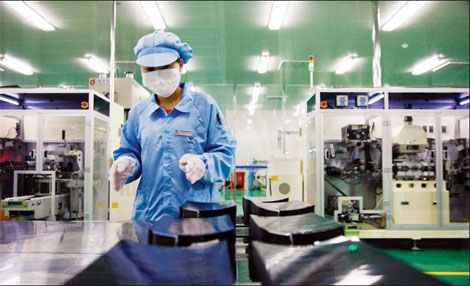|

A worker at a vehicle battery factory in Hangzhou. The Alliance for American Manufacturing has called for the US to curb auto parts imports from China and start more anti-dumping and anti-subsidy probes into Chinese engines, electronics and tires. Qilai Shen / Bloomberg
|
Ministry of Commerce warns sector to prepare for possible storm
BEIJING - The United States is likely to start more anti-dumping and anti-subsidy investigations into Chinese exports of auto parts, the Ministry of Commerce said on Thursday.
The Alliance for American Manufacturing claimed on Tuesday that the Chinese government had been subsiding its auto parts manufacturers, which it said had harmed US employment.
The alliance called for the US government to curb vehicle component imports from China and start more anti-dumping and anti-subsidy investigations into engines, electronics and tires from China, according to an announcement on the website of the commerce ministry.
"Chinese trade associations and companies should closely watch the developments of the accusations and make relevant preparations," the ministry said.
"If the US brings the case to the World Trade Organization (WTO) and starts investigations, Chinese exports of auto parts will be greatly affected because the US market is a traditional export destination, in addition to the European Union," said Wu Yuequn, assistant secretary-general of the Ningbo Auto Parts Association in Zhejiang province.
Wu said that Chinese companies' representatives would "actively respond to the investigations".
Yao Weiqun, associate president of the Shanghai WTO Affairs Consultation Center, agreed. Yao said that "Chinese industries involving automobiles and auto parts would be broadly affected" if the US launched investigations, noting that the industries are key contributors to economic growth.
China is the largest car market in the world and also one of the largest auto parts producers and exporters, with one-third of its output shipped to the US, according to a report by Usha C.V. Haley from the Economic Policy Institute, a consulting group to the US federal government's policymakers.
Another report from the institute said the Chinese government had provided "$27.5 billion in subsidies between 2001 and 2010 to its auto parts industry and about 1.6 million jobs in the US auto parts and supplier industries are threatened owing to rapidly growing imports".
In December, a US appeals court rejected the US Department of Commerce's imposition of duties on imported Chinese tires, saying in a ruling that US law does not allow the department to apply subsidy duties against products from non-market economies such as China.
Anti-dumping duties apply to goods sold overseas at or below the price in the home country, while anti-subsidy duties aim to offset the benefits of government subsidies to industries.
An official from the trade coordination department of the China Association of Automobile Manufacturers, speaking on condition of anonymity, said that "there are no government subsidies for auto parts manufacturers, which are almost all private businesses".
China imposed two-year anti-dumping and anti-subsidy duties on some vehicles from the US with engines larger than 2.5 liters starting from Dec 15.
Meanwhile, on Tuesday, the WTO Appellate Body rebutted China's appeal in limiting the exports of raw materials for resource depletion and environment degradation.
"We have to accept that Sino-US trade and Sino-European trade are experiencing a period of frequent friction because of the European debt crisis and the sluggish US economy," Yao said.
China Daily
(China Daily 02/03/2012 page15)
|


